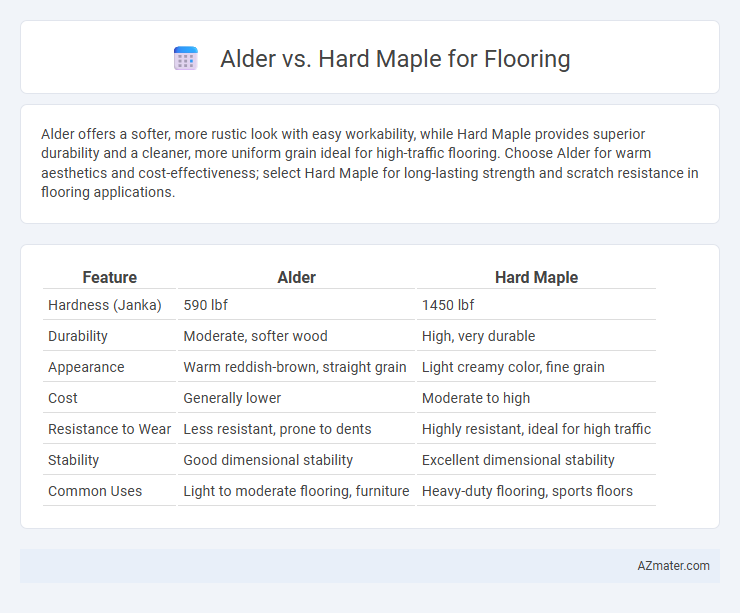Alder offers a softer, more rustic look with easy workability, while Hard Maple provides superior durability and a cleaner, more uniform grain ideal for high-traffic flooring. Choose Alder for warm aesthetics and cost-effectiveness; select Hard Maple for long-lasting strength and scratch resistance in flooring applications.
Table of Comparison
| Feature | Alder | Hard Maple |
|---|---|---|
| Hardness (Janka) | 590 lbf | 1450 lbf |
| Durability | Moderate, softer wood | High, very durable |
| Appearance | Warm reddish-brown, straight grain | Light creamy color, fine grain |
| Cost | Generally lower | Moderate to high |
| Resistance to Wear | Less resistant, prone to dents | Highly resistant, ideal for high traffic |
| Stability | Good dimensional stability | Excellent dimensional stability |
| Common Uses | Light to moderate flooring, furniture | Heavy-duty flooring, sports floors |
Introduction to Alder and Hard Maple Flooring
Alder flooring offers a warm, reddish-brown hue with a smooth texture, known for its moderate hardness rating of 600 on the Janka scale, making it suitable for medium-traffic areas. Hard maple flooring boasts a light, creamy appearance with a fine, consistent grain pattern and a higher Janka hardness rating of 1450, providing excellent durability for high-traffic spaces. Both woods are popular choices, but hard maple's superior strength and subtle grain make it ideal for long-lasting, resilient flooring applications.
Appearance and Color Variations
Alder wood features a warm, reddish-brown hue with subtle grain patterns, providing a smooth and consistent appearance ideal for rustic and traditional flooring styles. Hard Maple offers a lighter, creamy white to pale reddish-brown color with fine, uniform grain, creating a bright and clean aesthetic perfect for contemporary interiors. Color variations in Alder tend to be richer and more pronounced, while Hard Maple showcases more subtle contrasts and a more uniform look across planks.
Hardness and Durability Comparison
Hard Maple ranks significantly higher on the Janka hardness scale, typically around 1450, compared to Alder's softer rating of about 590, indicating superior resistance to dents and wear. Hard Maple's dense grain structure provides exceptional durability, making it ideal for high-traffic flooring applications where longevity and scratch resistance are critical. Alder, while softer and more prone to dents, offers a warmer aesthetic but requires more maintenance to preserve its appearance under heavy use.
Grain Patterns and Texture Differences
Alder flooring features a fine, uniform grain with a smooth texture, offering a consistent and warm appearance ideal for traditional interiors. Hard maple displays a tighter, more intricate grain pattern with subtle waves and a denser texture, providing durability and a sleek, modern aesthetic. The softer nature of alder results in softer wear marks, while hard maple's hardness enhances resistance to dents and scratches.
Installation and Workability
Alder offers superior workability for flooring installation due to its softer texture, allowing easier cutting, sanding, and nailing compared to Hard Maple. Hard Maple's density provides a more durable surface but requires specialized blades and tools to manage its hardness during installation. Choosing Alder simplifies the fitting process, while Hard Maple demands precision and experience to avoid chipping and extensive labor.
Cost and Value Considerations
Hard maple flooring commands a higher price due to its durability, density, and resistance to wear, making it a cost-effective investment for high-traffic areas. Alder wood offers a more affordable alternative, with softer characteristics and a warm tone, suitable for budget-conscious projects or low-traffic spaces. Evaluating long-term value involves balancing initial cost differences against maple's superior lifespan and minimal maintenance requirements.
Maintenance and Longevity
Hard maple flooring offers superior durability and resistance to wear, making it ideal for high-traffic areas and requiring less frequent refinishing compared to alder. Alder flooring, while softer and easier to dent, benefits from simpler maintenance routines due to its ability to absorb stains and scratches that can blend with its natural grain. Over time, hard maple's dense cellular structure contributes to a longer lifespan, sustaining its appearance and structural integrity through heavy use.
Environmental Impact and Sustainability
Alder flooring, sourced from faster-growing trees, offers a more sustainable option with lower carbon footprints compared to hard maple, which grows slower and requires more resources to mature. Hard maple's dense grain provides durability but often involves intensive harvesting practices that can impact forest ecosystems. Choosing alder supports ecological balance through quicker regeneration and reduced environmental strain, making it a greener choice for sustainable flooring.
Best Applications for Each Wood Type
Alder wood is ideal for flooring in residential spaces where a warm, rustic aesthetic is desired, offering softness that is suitable for low-traffic areas and easy customization through staining. Hard maple flooring excels in high-traffic commercial and residential environments due to its exceptional hardness and durability, providing a sleek, light-colored finish that resists dents and wear. Choosing alder supports cozy living rooms and bedrooms, while hard maple meets the demands of kitchens, hallways, and commercial spaces requiring resilience and longevity.
Final Verdict: Choosing Between Alder and Hard Maple
Hard Maple offers superior durability and resistance to wear, making it ideal for high-traffic flooring applications, while Alder provides a softer, warmer aesthetic favored in low-traffic or decorative settings. The choice hinges on priorities such as hardness rating, with Hard Maple scoring around 1450 on the Janka scale compared to Alder's 590, as well as color preference and budget considerations. For long-lasting, resilient floors, Hard Maple is the optimal selection; for affordable, visually appealing floors with a softer touch, Alder remains a strong contender.

Infographic: Alder vs Hard Maple for Flooring
 azmater.com
azmater.com